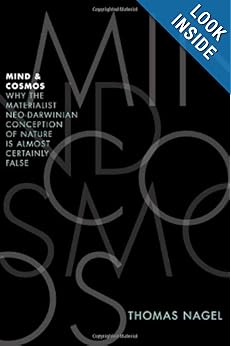
Just up at the Christian Scientific Society’s site, physicist David Snoke reviews Mind & Cosmos by Thomas Nagel (2012). Nagel, you will recall, is the atheist philosopher who has been vehemently attacked for doubting Darwin. Snoke writes,
For Nagel, the elephant in the room which has not been adequately explained by the theory of evolution, by a long shot, is the existence of Mind. We all live every day with our whole experience governed by our experience with Mind. Nagel asks how we can consider any explanation of life adequate which fails to explain this predominating fact. Even if we had a complete theory of evolution with all the physical mechanisms (A) which explained the existence of brains (B), it would fail to explain Mind (C) unless it could be shown that the physical mechanisms are intrinsically connected to the existence of Mind.
On reflection, it is surprising that the existence of Mind has not been considered a major problem to address in evolutionary thought. This stems from the early commitment of Western science to a sharp distinction between observer and observed. That distinction was fruitful, because early science too easily settled on conclusions that the scientists wanted to be true or felt to be true because of their personal experience. But it evolved into a complete removal of the observer from consideration.
The standard narrative of evolution is that having minds makes people better able to find resources and avoid threats, and this favored their survival in competition with other species. But this explains only those abilities: resource-finding and threat-avoidance. It does not explain some pervasive, fundamental aspects of Mind which seem unrelated to those goals. Nagel lists these under the categories of Consciousness, Cognition, and Value. More.
Follow UD News at Twitter!
